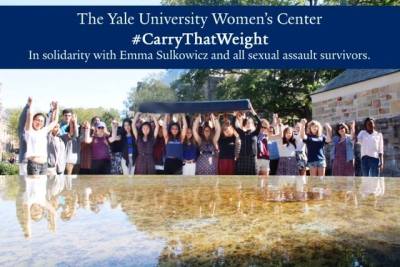
Yes, also related to the gay issue: I really don't care how many men hold hands in public (e.g. Bangladeshi constructions often do it around town for instance) just like primary school kids: this is INNOCENT as long as they do not kiss or express sexual affection: better than causing mayhem/ getting drunk to drown stress and cause little India mayhem etc.
Now the Columbia university girl student: Emma Sulkowicz who is now protesting that her consensual sex morphed into a rape as her partner's aim was not good... Without video proof: very hard to tell which is the truth. In any case, I dunno what is so fantastic about anus sex given that the risk of HIV as compared to vaginal sex is like 15times or 1500% higher: and vaginal use rated condoms: I'm sure are not insured against such use and are more likely to tear...
So unless we want to see more girls performing visual arts/ writing thesis titled "Carry that weight" or "Mattress performance" and humour high court judges with the details of their sexual escapade juxtaposed with the intricacies of consent/ contract law: I think that Singapore should reinstate penal code section 377 and BAN all forms of anus sex ALTOGETHER.
At a minimum: that would help keep Medishield-life, (a communist era inspired polls tax reincarnation), premiums to a minimum by keeping HIV etc related claims to a minimum so the rest of us do not have to subsidise the sexually deviant.

The original Section 377 (repealed in October 2007): "Whoever voluntarily hascarnal intercourse against the order of nature with any man, woman or animals, shall be punished with imprisonment for life, or with imprisonment for a term which may extend to 10 years, and shall also be liable to fine." [link]
Speaking With Emma Sulkowicz | Bwog
Video interview with Emma: http://m.youtube.com/watch?v=l9hHZbuYVnU
Opening soon @ Hong Lim Park: Carry that Weight Together
Quote:
| Jim: SEPTEMBER 28, 2014 @ 4:20 PM TRACK In reviewing this and various other articles about this matter, it strikes me that the system worked exactly as it is designed to work. Rape is a terrible crime and I believe that rapists should be severely punished, but I don't see any basis to criticize the administration of Columbia University for their handling of this case. 1. Rape, particularly date rape, is a difficult crime to prove. There are typically no witnesses (other than the accuser and the accused), there is often drugs or alcohol involved (which leads to cloudy recollections) and the victim is often shamed or embarrassed to go to the police, who will grill her for every detail, make her undergo a rape examination and other unpleasant matters.. 2. The standard of proof in a criminal matter is very high (beyond a reasonable doubt) and the potential penalty is very harsh (potentially lengthy prison sentence, having to register as "sexual crime offender", basically, his life will be ruined.) 3. For the above reasons, Columbia and other universities have enacted a separate, non-criminal procedure for reporting date rape. Since it's a non-criminal procedure, the standard of proof is significantly lowered (i.e., based on the evidence presented, was it "more likely than not" that the incident occurred as described by the accuser) and the penalties, which might include expulsion, do not include jail time and the matter is presumably kept confidential so it doesn't follow the accused around for the rest of his life. Plus, the victim doesn't have to tell her story to hardened police officers, but (presumably) more sympathetic faculty members. These procedures are enacted to make it easier for a victim to come forward with her story. 4. The accused in this case could have gone either route. She could have gone to the police or could have gone to the administration. She chose to do neither for six months or more. 5. When she finally reported the matter to the administration, her story was basically that she had had consensual sex with the guy twice before, was engaged in consensual sex with the guy a third time, but it became non-consensual they he switched from vaginal intercourse to anal intercourse without her consent. She says she clearly told him "no" and to stop. 6. Now, the story gets fuzzy at this point. It is unclear how long he continued anal sex, how forcefully she resisted, whether she yelled or screamed or tried to alert anyone else at the dorm. At some point he stopped (according to her, it was before he came) and left her room. 7. I have not seen any interviews of the accused, but his story to Columbia appears to be that the anal sex was initially consensual (or that he at least thought it was), but that she changed her mind (probably because she didn't like it after all) and when she told him to stop he then stopped and left, apparently because she was upset with him. 8. Now, given those two versions of events, what is Columbia supposed to do, particularly when the accuser doesn't report the incident until over six months later? Is the administration just supposed to automatically believe her story and expel the guy, or is it supposed to interview both parties, review any other evidence, and try to come with a decision based primarily upon the credibility of the two parties and their stories. I believe most of us would say the administration should do the latter, which is exactly what occurred here. 9. And, even after the administration had found the accused "not responsible," the accuser still retained her right to go the police to press charges, which she ultimately elected not to do. So, again, what did the university do wrong? And what is it supposed to do now? Enact a policy whereby anyone accused of date-rape is automatically found guilty? That the credibility of the witnesses is irrelevant? That lack of any physical evidence doesn't matter? That an accuser can wait months before reporting the incident and that shouldn't factor into the administration's decision? That if two other women claim the accused is "abusive" (i.e, a jerk), then the accused MUST be found guilty of sexual assault? Come on! The policy of the administration must be at least as much geared towards protecting the rights of the accused as it is to make sure the rights of the accuser are protected. I don't know what happened that night. I wasn't there. But neither was the administration. I don't know whether the accused is guilty or not, but it sure seems to me that Columbia University is innocent. Speaking With Emma Sulkowicz | Bwog |
__________________

No comments:
Post a Comment